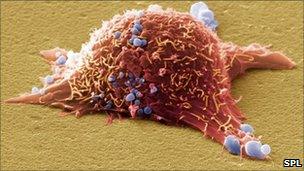Tayside is skin cancer 'hot spot'
- Published

Melanoma is the most common cause of cancer-related deaths in women in their 20s
Tayside has become a UK "hot spot" for skin cancer, a Dundee University scientist has said.
Dr Charlotte Proby said incidences of skin cancers in the area had increased fourfold over the past 30 years.
Long hours of sunshine, fair skin and young women increasingly using tanning salons could be to blame for the figures, she said.
Other areas of the UK where skin cancer is prevalent include the Scottish Borders and the English south coast.
Dr Proby, the university's clinical reader in dermatology, acknowledged that the high incidence of skin cancer in the region could be down to better recording of the condition.
But she said that other factors, such as the east coast's long hours of sunshine and the use of sunbeds, were also important.
Package holidays
"Over the past 30 years, skin cancers in Tayside have increased fourfold," she said.
"Fair-skinned Celts, with red or fair hair, blue eyes and freckles are much more susceptible to UV damage and there is increasing evidence that the use of sunbeds has resulted in more cases of melanoma in young women.
"Cheap package holidays to sunny destinations are also to blame."
The scientist said melanoma was the most common cancer in 15-24 year olds in Scotland and the most frequent cause of a cancer-related death in women in their 20s.
Dr Proby has been investigating the more aggressive forms of skin cancer for three years after a £165,752 grant from the Association for International Cancer Research.
She added: "We have established that there's a particular gene, called PTPRD, that seems to be associated with the more aggressive forms of skin cancer - that is cancers that spread to other parts of the body and can kill.
"We've been studying this gene which may well prove to be important for identifying and treating aggressive skin cancers in the future."
- Published2 May 2011
- Published28 April 2011
- Published11 April 2011
- Published6 April 2011